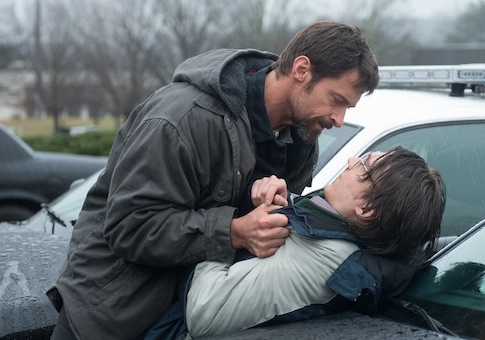There’s a moment midway through Prisoners when the camera focuses on a man slumped against the wall of a bathroom, the audience’s view of his face obscured by the sink basin he is chained to. There is blood on the floor, the walls, his wrists, and his clothes, everywhere. We know violence has been done to this person as we saw the beginning of his ordeal. We know the violence has continued because we have followed the characters perpetrating it. But we haven’t seen exactly what took place or the results.
The camera spins and we see, straight on, the damage done. His face is bloated, purple. His eyes are swollen shut. Blood drips from oozing cuts. This is not a face but a mask. The man’s features have lost any distinctiveness they may have had, and the swelling has reduced his visage to a series of sickening, ill colored, puffy masses. The audience gasps but cannot look away. We need to know if he will give up the information he has been so savagely beaten to obtain.
Such is the world of Prisoners, the distressing new thriller from Denis Villeneuve.
Alex Jones (Paul Dano) is the man chained to the sink. He is being tortured by blue-collar handyman Keller Dover (Hugh Jackman) and white collar Franklin Birch (Terrence Howard), high school pals whose daughters go missing on Thanksgiving. They were last seen in the vicinity of Jones’ RV, which had been circling the neighborhood.
Detective Loki (Jake Gyllenhaal) had Jones in custody but was forced to release him when police failed to find evidence linking him with the crime. Loki spends his time running down legitimate leads—interviewing sexual predators in the surrounding area, staking out candlelight vigils for someone returning to the scene of the crime—as Dover puts his fists to Jones.
Birch is troubled by the turn he and his friend has taken. Dover is less so. "We hurt him until he talks or they’re going to die—that’s the choice," Dover tells his friend. "He’s not a person anymore. He stopped being a person when he took our daughters."
As fists prove unpersuasive, Dover steps up his game: stress positions, scalding hot and freezing cold water, and confined, dark spaces become his tools. Dover’s behavior, and Birch’s allowance of it to continue, degrades them as much as Jones.
Prisoners is one part moral dilemma, one part intricately plotted thriller. Clues are doled out in regular intervals, and those who pay attention likely will be able to piece it together so long as their ears perk up at unexpected bits of exposition. The movie is not quite as tight as Silence of the Lambs—not much is—but Prisoners is in the same tradition of well-acted, claustrophobic, horror-thriller.
It has been a couple of years since Gyllenhaal has turned in a performance this commanding. He exhibits brooding intensity (Donnie Darko, Zodiac) far better than action-adventure (Prince of Persia) or action-romance (Source Code) or cowboy-romance (Brokeback Mountain).
Jackman, meanwhile, infuses a desperate pathos into Dover. We believe he will do anything to keep his family safe, but that surety is not comforting. It is, in fact, discomfiting and terrifying—we are shown a portrait of a man whose moral bearing has strained, then snapped, under the pressure of a horrifying life event.
Not for the weak of stomach, Prisoners is a sure signifier that summer is over, more serious fare has arrived in theaters, and the Oscar race has begun. Not quite best picture fare, this film is nevertheless an entertaining, if harrowing, way to spend two-and-a-half hours.
